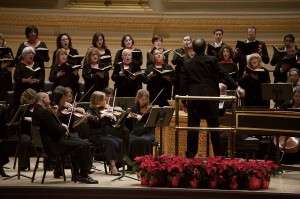|
Back
In the Presence of Masters New York
Carnegie Hall: Issac Stern Auditorium
12/20/2011 - and December 21*, 2011
George Frideric Handel: Messiah
Leslie Fagan (soprano), Sasha Cooke (mezzo-soprano), Cullen Gandy (tenor), Kevin Deas (bass)
Musica Sacra Chorus and Orchestra, Kent Tritle (Music Director and conductor)

Musica Sacra (© Richard Ten Dyke)
There are so many reasons to treasure Carnegie Hall. Aside from its glorious acoustics and the plethora of fine musical talent who perform there, there is something else uniquely experienced there. It’s history, a dimension perhaps often taken for granted by those who live on the other side of the Atlantic. But New Yorkers have so few physical landmarks to connect us to our past. The tendency here – alas -- is to tear down the old and venerable and replace it with the new and tacky. In fact, Carnegie Hall only escaped such a fate (replacement by an office building) thanks to the heroic efforts of Issac Stern, whose name now graces Carnegie’s main auditorium. Tchaikovsky and Mahler conducted in that auditorium – the former on opening night in 1891. One of the delights of attending a performance is wandering around during the intermission and taking in the musical autographs and portraits lining the walls.
Handel of course never came to New York. His physical presence can be best felt in London at three sites: the Handel House, St. George’s Hannover Square, where Handel was a parishioner, and the Foundling Hospital, where Handel served as one of the governors and where yearly performances of his Messiah raised much needed funds to pay for care of the children. Last season, our conductor for the Musica Sacra Messiah gave New Yorkers a chance to hear a work composed by Handel specifically for the Hospital, a work featuring a borrowed version of his “Hallelujah Chorus.” He did this wearing one of his many hats, Music Director of the Church of Saint Ignatius Loyola. (Read here)
Handel’s music has been very much a presence in New York this season, beginning with a wonderful revival of Rodelinda a the Met (Read here) and, recently, two excerpts from Partenope in Iestyn Davies’s terrific debut recital at Carnegie’s Weill Recital Hall (Read here) And, of course, the Christmas season has seen performances of Handel’s Messiah just about everywhere – with so many of them conducted by the indefatigable Mr. Tritle.
Musica Sacra, a small and lean ensemble, has been performing Messiah annually since 1976. Despite the size of the Issac Stern Auditorium, its sound was full and glorious yet with a certain intimacy that made the Christmas message seem so much more personal. The performance featured modern instruments but period practice, creating a sense of authenticity but also a feeling of freshness.
This was a lovely performance – graceful, elegant, beautifully judged, carefully prepared, and immaculately sung by the chorus and the four soloists. There was marvelous mirroring between voices and instruments and soloists and chorus. The textures were clear and transparent. The strings were particularly lush and stunning. The highpoint for the orchestra was the “Pastoral Symphony” – evoking a peaceful landscape of ethereal beauty. Here and throughout the evening, Handel’s melodic gifts were fully displayed and honored by the performers, particularly those extraordinary string players.
Mezzo soprano Sasha Cooke was just superb. She sang “But who may abide” with a warm, rich, powerful voice, and eloquent phrasing. Her performance of the aria, “He was despited” was beautifully and sensitively varied and, at times, almost unbearably poignant. Soprano Leslie Fagan sang a particularly fine “Rejoice greatly” with bell like delicacy, great flexibility and spot on intonation in her coloratura passages. She is a very engaged and involved performer; her physical movements and bearing were just right. Tenor Cullen Gandy, still a student at Juilliard, made a distinguished Carnegie Hall debut. His arioso, “Behold and see” was sung with a lovely tone and eloquent phrasing. Bass Kevin Deas sang with dignity and solemnity, steady tone and excellent diction. He and the trumpet player, gave us a wonderfully rousing “The trumpet shall sound.”
As for Mr. Tritle, he continues to amaze, inspire, and delight. New York is lucky indeed to have him in our midst.
Arlene Judith Klotzko
|